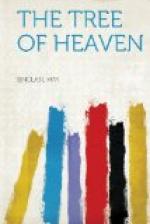For the first few weeks the War meant to Dorothea, not bleeding wounds and death, but just these train-loads of refugees—just this one incredible spectacle of Belgium pouring itself into Cannon Street Station. Her clear hard mind tried and failed to grasp the sequences of which the final act was the daily unloading of tons of men, women and children on Cannon Street platform. Yesterday they were staggering under those bundles along their straight, flat roads between the everlasting rows of poplars; their towns and villages flamed and smoked behind them; some of them, goaded like tired cattle, had felt German bayonets at their backs—yesterday. And this morning they were here, brave and gay, smiling at Dorothea as she carried their sick on her stretcher and their small children in her arms.
And they were still proud of themselves.
A little girl tripped along the platform, carrying in one hand a large pasteboard box covered with black oilcloth, and in the other a cage with a goldfinch in it. She looked back at Dorothea and smiled, proud of herself because she had saved her goldfinch. A Belgium boy carried a paralyzed old man on his shoulders. He grinned at Dorothea, proud of himself because he had saved his grandfather. A young Flemish peasant woman pushed back the shawl that covered her baby’s face to show her how pretty he was; she laughed because she had borne him and saved him.
And there were terrible things significant of yesterday. Women and girls idiotic with outrage and grief. A young man lamed in trying to throw himself into a moving train because he thought his lost mother was in it. The ring screening the agony of a woman giving birth to her child on the platform. A death in the train; stiff, upturned feet at the end of a stretcher that the police-ambulance carried away.
And as Dorothea drove her car-loads of refugees day after day in perfect safety, she sickened with impatience and disgust. Safety was hard and bitter to her. Her hidden self was unsatisfied; it had a monstrous longing. It wanted to go where the guns sounded and the shells burst, and the villages flamed and smoked; to go along the straight, flat roads between the poplars where the refugees had gone, so that her nerves and flesh should know and feel their suffering and their danger. She was not feeling anything now except the shame of her immunity.
She thought: “I can’t look at a Belgian woman without wishing I were dead. I shall have no peace till I’ve gone.”
Her surface self was purely practical. She thought: “If I were in Belgium I could get them out of it quicker than they could walk.”
Dorothea could bring all her mind to bear on her Belgians, because it was at ease about her own people. They, at any rate, were safe. Her father and poor Don were out of it. Michael was not in it—yet; though of course he would be in it some time. She tried not to think too much about Michael. Nicky was safe for the next six months. And Frank was safe. Frank was training recruits. He had told her he might be kept indefinitely at that infernal job. But for that he would be fighting now. He wanted her to be sorry for him; and she was sorry for him. And she was glad too.




